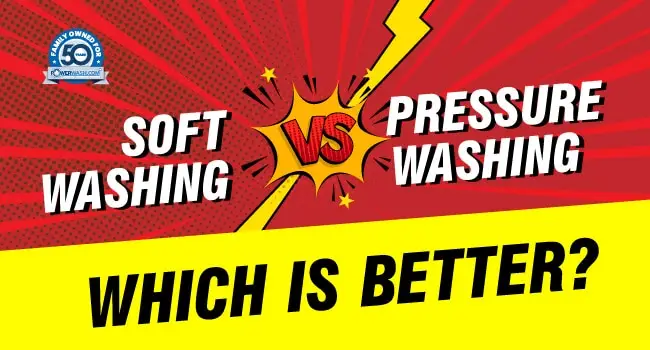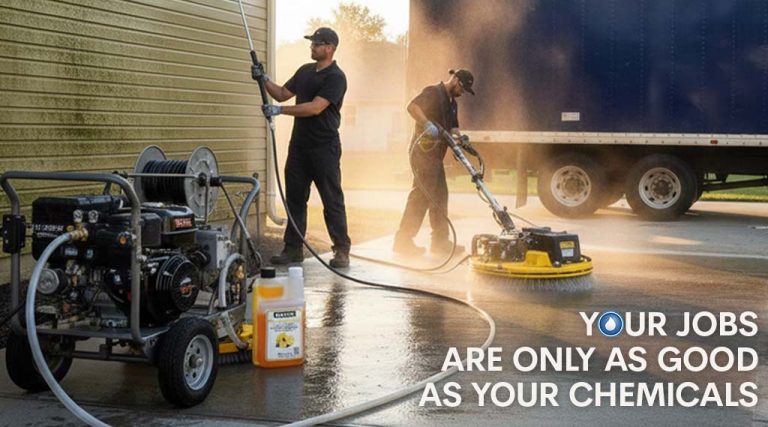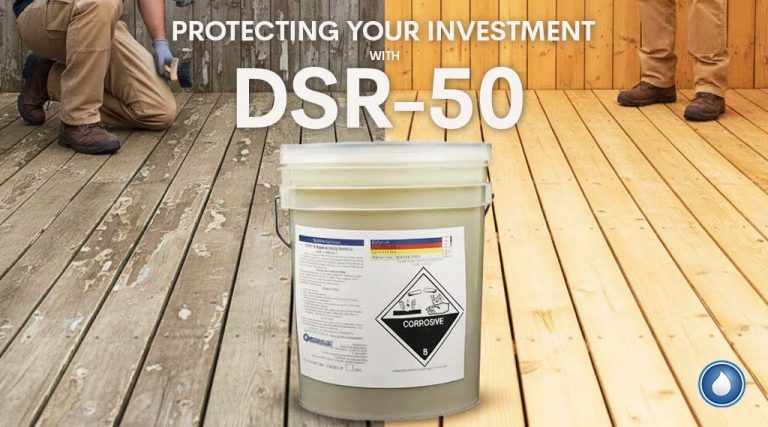In the competitive world of power washing, where every job demands a flawless finish, the choice between soft washing and pressure washing can be pivotal. As you know, the reputation of a power washing business hinges on its ability to deliver exceptional results while also safeguarding surfaces. So, what’s the answer to the age-old debate of soft washing vs. pressure washing? In this tug-of-war, the answer lies not in declaring one better method but in understanding each technique’s unique strengths.
What is soft washing vs. pressure washing?
The primary distinction between pressure washing and soft washing lies in the levels of pressure applied. Pressure washing employs intense, high-pressure water jets to eliminate dirt and filth. In contrast, soft washing utilizes a low-pressure power washer combined with cleansing solutions to clean various surfaces effectively.
The Go-To High-Intensity Cleaning Technique
Pressure washing has been the industry’s go-to for years, and for good reason. The sheer power of pressurized water effectively removes dirt, grime, oil stains, and even paint from surfaces. Regarding soft or pressure washing, pressure is the best method for cleaning rugged, hard surfaces like concrete driveways, brick walls, and metal structures. Homeowners are often amazed by the immediate transformation, and efficiency can be a strong selling point for a power washing business.
You know what they say, though – with great power comes great responsibility. Overzealous pressure washing can inadvertently cause damage to delicate surfaces like wood siding, asphalt shingles, and stucco. Also, when considering soft washing vs. pressure washing, it is good to remember that pressure might only address surface-level issues, leaving underlying problems like mold and algae untreated.
Pressure washing, often called power washing, employs a high-pressure water spray ranging from 1,300 to 2,800 PSI to clean exterior surfaces. This technique shares common cleaning goals with soft washing, targeting stains and buildup such as loose paint, mold, mud, dust, dirt, and grime. However, unlike soft washing, pressure washing relies solely on water pressure and doesn’t involve chemicals.
Note that the force of pressure washing can be remarkably strong. Because of that, when pressure washing surfaces intended for a gentler treatment, there’s the risk of unintended damage. The mortar or grout between bricks or tiles and paint on walls can be stripped away. Roof cleaning might lead to asphalt removal, and water can infiltrate beneath a home’s siding at high pressure, causing water damage to the property.
Given these considerations, pressure washing is most suitable for:
- Stone
- Asphalt driveways
- Garage floors
- Sidewalks
- Patios
- Concrete
- and treated wooden decks
A Gentle Approach to Cleaning
Soft washing has emerged as a gentler alternative, especially when dealing with surfaces that require a more delicate touch. When considering soft washing vs. pressure washing, the gentler technique combines biodegradable cleaning agents and low-pressure water streams to eliminate dirt, bacteria, mold, and other contaminants. Soft washing is particularly beneficial for surfaces like vinyl siding, wooden decks, and roofs, where preserving the integrity of the material is paramount.
Offering soft washing can have multiple advantages for a power washing business, such as confidently offering services to a broader range of clients who value their surfaces’ longevity or need gentler cleaning methods. Since soft washing solutions often have residual effects, your clients will appreciate the long-lasting cleanliness.
Soft washing generally involves using a pump sprayer that combines water spray with carefully selected chemicals. The sprayer operates at a pressure ranging from 150 to 300 PSI, ensuring a controlled cleaning process. And, if you’re looking for a proportioner, we recommend the Maverick Sidewinder Pro Clear. The chemicals used in soft washing include sodium hypochlorite (bleach), sodium hydroxide, algaecides, and water. To mitigate the potential adverse effects on plants and the environment, neutralizers are often combined with the chemicals used. Remember that the compatibility of the pump’s materials with the chosen chemicals is also crucial when selecting the right system.
When comparing pressure washing vs. soft washing, soft washing is particularly useful for removing a variety of stains and buildup, including mold, mildew, fungus, algae, bacteria, wildlife debris, bird droppings, bugs, oil, grease, tree sap, organic matter, rust, graffiti, and paint spills.
This gentle method suits various outdoor surfaces, including:
- Vinyl siding
- Cedar shake siding
- Wood siding
- Roofs
- Pavers
- Brick
- Tile
- Stucco
- Windows
- Doors
- and outdoor furniture
The Verdict of Soft Washing vs. Pressure Washing
Ultimately, the choice between soft washing and pressure washing depends on the specific needs of the job and the client. Soft washing is a versatile option that offers a controlled and gentle approach to cleaning a wide range of surfaces. On the other hand, pressure washing brings intense cleaning power but should be applied wisely to surfaces that can withstand the force.
Key Takeaways:
- Regarding soft washing vs. pressure washing, pressure is the best method for cleaning rugged, hard surfaces like concrete driveways, brick walls, and metal structures.
- Overzealous pressure washing can inadvertently cause damage to delicate surfaces like wood siding, asphalt shingles, and stucco.
- When considering soft washing vs. pressure washing, the gentler technique combines biodegradable cleaning agents and low-pressure water streams to eliminate dirt, bacteria, mold, and other contaminants.
- Soft washing is particularly beneficial for surfaces like vinyl siding, wooden decks, and roofs, where preserving the integrity of the material is paramount.
- Ultimately, the choice between soft washing and pressure washing depends on the specific needs of the job and the client.
Work With the Right Supplier
Selecting the appropriate method, whether soft washing or pressure washing, will position your power washing business to cater to a diverse clientele while ensuring the longevity of the surfaces cleaned. By understanding the nuances of each technique and assessing the client’s requirements, you’ll be equipped to deliver outstanding results that speak volumes about your expertise in the field. At POWERWASH.com, we help our partners deliver the best possible results on any soft and pressure washing job. Call today to talk to a power washing expert and take control of your soft washing operation.




